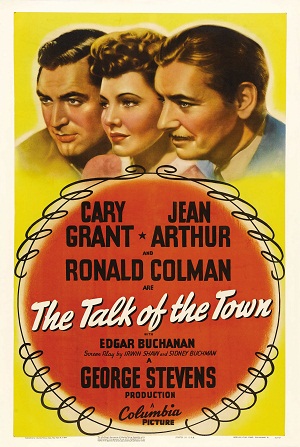The fourth film on my DVR was the 1942 film, The Talk of the Town. The Talk of The Town originally aired on TCM on March 20th and I recorded it because it was a best picture nominee. As some of our regular readers undoubtedly know, it’s long been a goal of mine to watch and review every single film nominated for Oscar’s top prize.
The Talk of The Town is an odd little hybrid of comedy, melodrama, and a civics lecture. Michael Lightcap (Ronald Colman) is a brilliant attorney and legal professor. He’s been shortlisted for the Supreme Court and he’s also a widely read author. In fact, he’s even rented a house for the summer, so that he may work on a book. The owner of the house — teacher Nora Shelley (Jean Arthur) — will also be acting as his secretary.
As well-read as Prof. Lightcap may be, he’s also rather stuffy and out-of-touch with what’s going on outside of the world of academia. He knows how the law should work but he has little understanding of how the law actually does work. Fortunately, he gets a lesson in reality when he arrives at the house and eventually meets the gardener, Joseph (Cary Grant). Joseph turns out to be surprisingly intelligent and very passionate about politics. Lightcap and Joseph have many debates about whether or not the American legal system actually protects the working man.
What Lightcap doesn’t know is that Joseph is actually Leopold Dilg. Leopold is a labor activist, the type who you always see in old documentaries, standing on a street corner and preaching about unions. Leopold is also a fugitive. He was accused of setting fire to a mill, a fire that apparently led to the death of the foreman. Despite the fact that he loudly proclaimed his innocence, Leopold was arrested and prosecutors announced that they would seek the death penalty. Convinced that he would never get a fair trial, Leopold escaped from jail and fled to Nora’s house.
Nora and Leopold went to school together. They love each other, even though circumstances — mostly his political activism — conspired to keep them apart. When Lightcap moves into the house, Nora and Leopold’s attorney, Sam (Edgar Buchanan), hope that they can convince him to take on Leopold’s case. However, they also have to not only convince Leopold to reveal his true identity but also convince Lightcap to put his supreme court appointment at risk by defending a politically unpopular defendant. Their solution is to trick Lightcap into falling in love with Nora and then convince him to take on the case for her.
However, Nora soons finds herself falling in love with Lightcap for real. Who will she choose in the end? Cary Grant or Ronald Colman? Today, it seems like a pretty easy decision but apparently, in 1942, Columbia Pictures actually shot two different endings for the movie.
The Talk of The Town is an odd little movie. For the most part, it’s a drama. But it also has plenty of comedic elements, mostly dealing with the attempts to keep Leopold’s identity a secret. In the end, it’s a little bit too preachy to really work as either a drama or a comedy. That said, I still liked The Talk Of The Town because it made a strong case for the importance of due process, which is a concept that a lot of people take for granted.
(At the same time, The Talk of the Town was made in 1942 so you never have any doubt that Lightcap’s belief in the American legal system will eventually be vindicated. With America having just entered World War II, 1942 was not a time for cynicism. If Talk of the Town has been made in the 30s, it probably would have been a very different movie.)
Probably the best thing about Talk of the Town is the cast. It may not be a great film but, when you’ve got Cary Grant and Jean Arthur in a scene together, it almost doesn’t matter.
The Talk of the Town was nominated for best picture but it lost to Mrs. Miniver.
